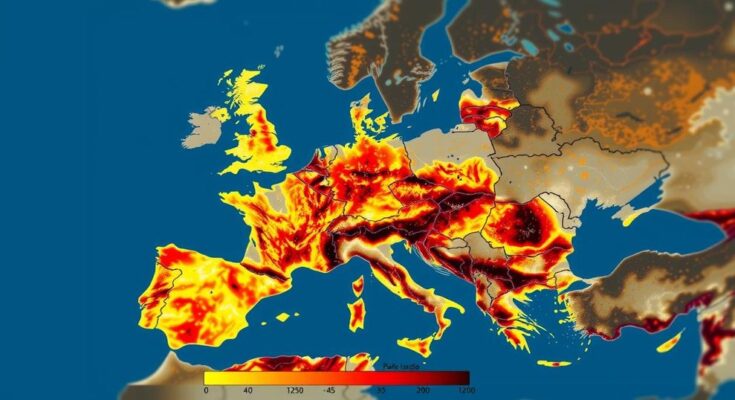A study by the Helmholtz Centre for Environmental Research revealed that approximately 30% of the intensity and extent of the 2022 drought in Central and Southern Europe was intensified by human-induced climate change. The drought, marked by low precipitation and high temperatures, severely impacted agriculture, water supply, and ecosystems across the region, with significant socio-economic consequences observed during summer 2022. The findings stress the need for improved water management practices as climate-related challenges continue to intensify.
In the summer of 2022, Central and Southern Europe experienced an exceptionally intense drought that significantly dried out the soil across various regions. A research team from the Helmholtz Centre for Environmental Research (UFZ) has determined that approximately 30% of the drought’s unprecedented severity and extent can be directly linked to human-induced climate change. This finding, published in Nature Geoscience, highlights the ongoing impact of climate change on soil moisture levels, which had been in continual decline in previous years. The drought had considerable repercussions for public life in several countries during the months of June to August. For instance, about half of Italy’s population was subjected to water restrictions, and over 100 municipalities in France relied on trucked water supplies. The agricultural sector was significantly affected, with yields of grain maize, sunflowers, and soybeans decreasing by 15% compared to the averages recorded from 2017 to 2021. Severe forest fires unfolded across countries such as Italy, France, Slovenia, and Romania, while waterways like the Po and Rhine faced navigation constraints, and hydroelectric power generation plummeted due to diminished water discharge. Dr. Emanuele Bevacqua, the lead author of the study, remarked, “The summer drought in 2022 had serious socio-economic consequences for Europe.” While the Intergovernmental Panel on Climate Change (IPCC) had previously established that human activities contribute to droughts, the specific extent of this influence on individual drought events has not been thoroughly understood until now. The researchers utilized observational data and the mHM hydrological model—developed at UFZ—to analyze the water storage levels in soil and river discharge throughout Europe. The findings revealed that over the drought period from June to August, there was a significant simulated soil moisture deficit in Central and Southern Europe, amounting to approximately 280 cubic kilometers—equivalent to the volume of 120 million swimming pools—affecting about 1.64 million square kilometers, or 29% of the land area in these regions. Dr. Bevacqua noted, “Our simulations show that the 2022 drought was the most extreme since 1960.” The severity of this drought was exacerbated by a distinct lack of precipitation and extreme heat; Central and Southern Europe recorded summer temperatures that were 1.9 degrees Celsius above historical averages. Dr. Jakob Zscheischler, co-author of the study, indicated that climate change’s contribution to the drought was both immediate and delayed, with rising temperatures increasing evaporation rates and affecting water availability in waterways. The research team quantified that approximately 31% of the soil moisture deficit, and 38% of the drought-affected area, can be ascribed to climate change. This lagged effect of climate change begins well before signs of drought become apparent and has critically contributed to the worsening conditions. As Dr. Zscheischler stated, “Little attention has been given to date to the role of the delayed effects of climate change on droughts.” This significant analysis offers valuable insights into how climate change is reshaping water resources across Europe and underscores the urgent need for improved groundwater management as more than two-thirds of the European population rely on groundwater, which is already being over-exploited in numerous cities.
In recent years, climate change has been increasingly recognized as a significant driver of extreme weather events, including prolonged droughts. The summer of 2022 presented one such instance in Central and Southern Europe, where a combination of insufficient precipitation and elevated temperatures led to severe ecological and economic disruptions. Understanding the role of human activities in exacerbating these conditions is crucial for developing effective strategies for mitigation and adaptation in addressing climate-related disasters. The study by the Helmholtz Centre for Environmental Research sheds light on these dynamics, presenting pertinent data that demonstrates a clear link between anthropogenic climate change and the intensity of the drought experienced in 2022.
The 2022 drought in Central and Southern Europe exemplifies the profound and escalating impacts of climate change on natural resources and human activities. By accounting for both immediate and delayed effects of climate change, researchers reaffirm the importance of focusing on sustainable water management practices. As substantial portions of Europe’s population depend on groundwater, understanding and addressing the evolving challenges posed by climate change is essential for securing water resources for future generations. The findings from this research call for urgent action to mitigate climate change and adapt to its increasing influence on weather patterns and resource availability. They also highlight the necessity for comprehensive groundwater management strategies across the region to ensure resilience against future climate extremes.
Original Source: phys.org




